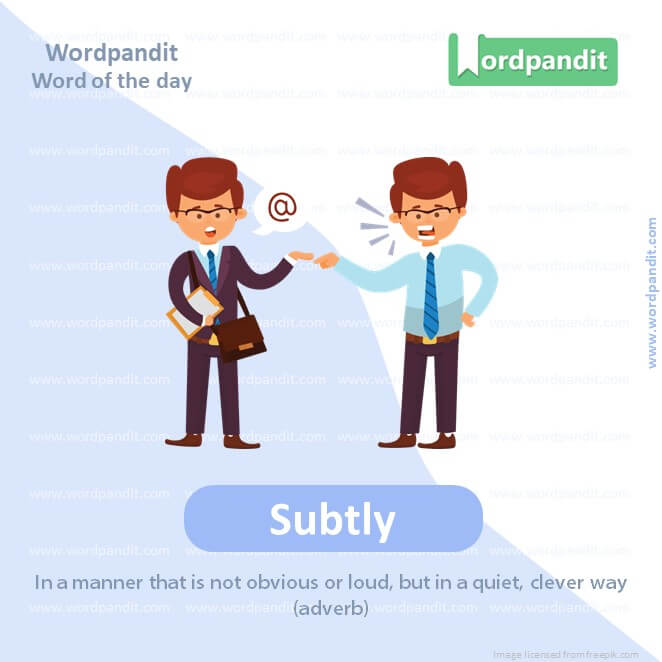Daily Vocabulary Words: List of Daily Used Words in Leading Indian Newspapers
Hi there. Welcome to this special section @ Wordpandit. Our endeavour here is straightforward: highlighting daily vocabulary words that you would come across in leading newspapers in the country. We have included the following newspapers in our selection:
• The Times of India
• The Economic Times
• Hindustan Times
• Mint
• Indian Express
We are putting in extensive work to develop your vocabulary. All you have to do is be regular with this section and check out this post daily. This is your repository of commonly used words; essentially, we are posting a list of daily used words. Hence, this has significant practical application as it teaches you words that are commonly used in leading publications mentioned above.
Visit the website daily to learn words from leading Indian newspapers.

WORD-1: Lingered
CONTEXT: Respiratory illnesses have lingered above the national baseline since November, according to the Centers for Disease Control and Prevention, as influenza, Covid-19, RSV and the common cold circulate.
SOURCE: Live Mint
EXPLANATORY PARAGRAPH: Imagine you’re playing at the park, and even though your mom says it’s time to go home, you walk really slowly and keep looking back at the swings because you don’t want to leave. That’s like when someone “lingered.” They stay a bit longer because they don’t want to go away or end something fun.
MEANING: Stayed in a place longer than necessary, typically because of a reluctance to leave (verb).
PRONUNCIATION: LIN-gurd
SYNONYMS: loitered, dawdled, tarried, hovered, stayed, remained
USAGE EXAMPLES:
1. After the party ended, she lingered behind to help clean up.
2. Memories of the day lingered long into the night.
3. He lingered in the doorway, unsure whether to enter.
4. The scent of her perfume lingered in the room after she left.

WORD-2: Chugging
CONTEXT: Johnson, who works a hybrid schedule, recently kept chugging through a sinus infection.
SOURCE: Live Mint
EXPLANATORY PARAGRAPH: Think about when you’re drinking a big glass of water really fast without stopping, like you’re super thirsty from playing, and you go “glug, glug, glug.” That’s what “chugging” means. It’s like drinking or moving quickly and steadily without stopping.
MEANING: To drink something in large gulps quickly or to move heavily or steadily (verb).
PRONUNCIATION: CHUH-ging
SYNONYMS: gulping, swigging, drinking rapidly, guzzling, sipping quickly
USAGE EXAMPLES:
1. He was chugging water after running in the sun.
2. The old train was chugging along the tracks.
3. They were chugging beers at the party.
4. She heard the engine chugging before it stopped.
WORD-3: Sinus
CONTEXT: Johnson, who works a hybrid schedule, recently kept chugging through a sinus infection.
SOURCE: Live Mint
EXPLANATORY PARAGRAPH: Imagine you have a hidden space in your head, not for storing toys, but a space that helps you breathe and makes your voice sound. That’s called a “sinus.” Sometimes, when you get a cold, this space can get all stuffed up, and that’s why your voice sounds funny and your head feels heavy.
MEANING: A hollow space in the bones around your nose that helps you breathe and affects how your voice sounds (noun).
PRONUNCIATION: SY-nuhs
SYNONYMS: cavity, hollow, air pocket, passage, vent
USAGE EXAMPLES:
1. She went to the doctor because her sinuses were blocked.
2. Sinus infections can make your whole face feel sore.
3. He has sinus problems whenever the seasons change.
4. Taking steam helps in clearing the sinuses.

WORD-4: Subtly
CONTEXT: Subtly or explicitly, bosses sometimes urge employees to ignore minor symptoms. Their own reluctance to take sick days can signal that subordinates are expected to gut it out.
SOURCE: Live Mint
EXPLANATORY PARAGRAPH: Imagine you’re trying to hint to your friend that you want a piece of their chocolate bar without saying it directly. You might smile at the chocolate or look at it in a special way. That’s being “subtly” hinting. You’re doing or saying something in a quiet, almost secret way that’s not too obvious.
MEANING: In a manner that is not obvious or loud, but in a quiet, clever way (adverb).
PRONUNCIATION: SUH-tlee
SYNONYMS: slightly, delicately, faintly, indirectly, quietly
USAGE EXAMPLES:
1. She subtly hinted that it was time to leave.
2. The movie’s message was subtly delivered.
3. He subtly changed the subject of the conversation.
4. The colors in the painting changed subtly.
WORD-5: Explicitly
CONTEXT: Subtly or explicitly, bosses sometimes urge employees to ignore minor symptoms. Their own reluctance to take sick days can signal that subordinates are expected to gut it out.
SOURCE: Live Mint
EXPLANATORY PARAGRAPH: If you tell your friend exactly what you want for your birthday, like “I want a blue bicycle with white stripes,” you’re being very clear and leaving no room for guessing. That’s what “explicitly” means. It’s when you say or explain something so clearly that everyone understands without any confusion.
MEANING: In a clear and detailed manner, leaving no room for confusion or doubt (adverb).
PRONUNCIATION: ik-SPLIS-it-lee
SYNONYMS: clearly, specifically, plainly, directly, unmistakably
USAGE EXAMPLES:
1. The teacher explicitly stated the rules.
2. She explicitly asked not to be disturbed.
3. The contract explicitly outlines the penalties.
4. Instructions were given explicitly to avoid errors.

WORD-6: Reluctance
CONTEXT: Subtly or explicitly, bosses sometimes urge employees to ignore minor symptoms. Their own reluctance to take sick days can signal that subordinates are expected to gut it out.
SOURCE: Live Mint
EXPLANATORY PARAGRAPH: Imagine you really don’t want to clean your room even though your parents told you to. You’re dragging your feet and maybe even whining a bit about it. That feeling of not wanting to do something is called “reluctance.” It’s when you’re not eager or willing to do something.
MEANING: Unwillingness or hesitation to do something (noun).
PRONUNCIATION: ree-LUK-tuhns
SYNONYMS: hesitation, unwillingness, resistance, hesitancy, disinclination
USAGE EXAMPLES:
1. His reluctance to join the team was obvious.
2. There was a clear reluctance in her voice.
3. Despite his reluctance, he agreed to help.
4. Her reluctance to leave was understandable.

WORD-7: Exaggerate
CONTEXT: Almost a quarter said they suspect workers lie about being sick or exaggerate the severity of their illnesses.
SOURCE: Live Mint
EXPLANATORY PARAGRAPH: Imagine you’re telling a story about a fish you caught, but instead of saying it was a small fish, you say it was as big as a dog! That’s called “exaggerating.” It’s when you make a story or something seem much bigger, better, or worse than it really is to make it more exciting or important.
MEANING: To make something seem larger, more important, better, or worse than it really is (verb).
PRONUNCIATION: ig-ZAJ-uh-rayt
SYNONYMS: overstate, embellish, amplify, inflate, magnify
USAGE EXAMPLES:
1. He tends to exaggerate his achievements.
2. She exaggerated the difficulty of the task.
3. They exaggerated the size of the crowd.
4. The story was exaggerated with each telling.
WORD-8: Contagious
CONTEXT: Workers can’t win, Haller says. They feel shamed by bosses if they call in sick or shamed by colleagues if they show up contagious.
SOURCE: Live Mint
EXPLANATORY PARAGRAPH: Think about when someone in your class has a cold and starts sneezing, and then a few days later, lots of other kids start sneezing too. That’s because colds are “contagious.” It means something, like a cold or laughter, can spread from one person to another really easily.
MEANING: Capable of being spread from one person to another by touch or through the air, often referring to diseases (adjective).
PRONUNCIATION: kuhn-TAY-juhs
SYNONYMS: infectious, transmissible, communicable, spreadable, catching
USAGE EXAMPLES:
1. The flu is highly contagious.
2. Her laughter was so contagious, everyone started laughing.
3. They put up signs warning that the illness was contagious.
4. He stayed home because he didn’t want to be contagious to his friends.
WORD-9: Mutations
CONTEXT: The good news is the latest Covid variant appears less dangerous, or at least no worse, than previous versions. The bad news is the virus’s mutations keep adding to the list of ways people can get sick.
SOURCE: Live Mint
EXPLANATORY PARAGRAPH: Imagine you’re drawing a butterfly, but instead of giving it two wings, you decide to draw it with four wings! That change you made is kind of like a “mutation.” In science, a mutation is when something changes in the way living things are made up, which can make them different from their parents, like plants with new colors of flowers or animals with extra fins.
MEANING: Changes in the genetic material of a living organism that can lead to differences in how it looks or functions (noun).
PRONUNCIATION: myoo-TAY-shuns
SYNONYMS: alterations, variations, changes, modifications, transformations
USAGE EXAMPLES:
1. Some mutations can be beneficial to the organism.
2. Scientists study mutations to understand evolution.
3. The mutation caused the plant to have blue flowers.
4. Certain mutations can be passed down through generations.
WORD-10: Grievance
CONTEXT: It may not be enough to win a grievance case, but businesses can pay a price in reputation and morale.
SOURCE: Live Mint
EXPLANATORY PARAGRAPH: Imagine you’re playing a game, and you think the rules aren’t fair to everyone. You might feel upset or that something wrong has happened. When you tell someone about this feeling, hoping for a change, that’s called a “grievance.” It’s when you have a complaint or feel something isn’t right and you want it to be fixed.
MEANING: Complaints or reasons for feeling unhappy or unsatisfied (noun).
PRONUNCIATION: GREE-vuhns
SYNONYMS: complaint, objection, protest, issue, dissatisfaction
USAGE EXAMPLES:
1. The workers presented their grievances to management.
2. She filed a grievance against her supervisor.
3. The union is addressing the grievance about pay.
4. Hearing the grievance, they promised to investigate.
vocabulary journal
Are you seeking ways to elevate your language skills? Consider diving into a vocabulary journal. This method has proven instrumental in learning and grasping new words. The benefits of maintaining a vocabulary journal are far-reaching, aiding students, writers, and language enthusiasts alike.
A vocabulary journal is a personal tool that pushes you to explore the depths of language beyond surface understanding. It doesn’t demand any complex skills; all you need is consistency, interest, and a willingness to learn. This simple, yet efficient, method aids you in enriching your language abilities by creating a personalized resource of words that you encounter and learn every day.
How exactly do you learn from a vocabulary journal? It starts from the moment you encounter a new word. Don’t just gloss over it. Instead, jot it down in your journal. With this, your vocabulary journal becomes a growing garden of words, where every new addition sprouts the opportunity for more profound knowledge. Following this method encourages self-education, as it fosters independent research into the meaning, synonyms, antonyms, and uses of the new word.
Moreover, a vocabulary journal is not meant for one-time usage. Regularly revisit your notes and try to use the words in your daily conversations or writings. Over time, these fresh words will naturally weave themselves into your lexicon, refining your language skills.
Being able to articulate your thoughts precisely is an empowering skill. A vocabulary journal is a pathway towards achieving this feat. No matter your current language capabilities, initiating and maintaining a vocabulary journal continues to be a worthwhile endeavor.
Enhancing your language skills with a vocabulary journal is synonymous with building a bridge between learning and understanding. Journey through the vast landscapes of language with a vocabulary journal in tow and discover the joy of never running out of words.







